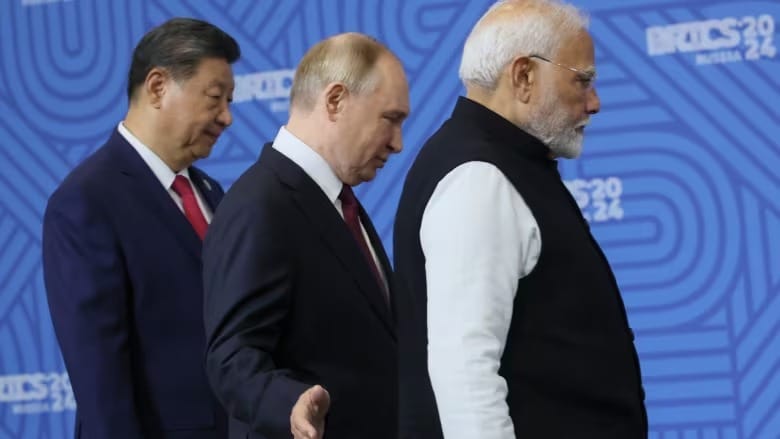India makes it clear it's not interested in a Western alliance
As the dispute over assassination plots lingers, the Modi government rebuffs U.S. attempts to woo India.

First Meeting in Five Years Between Modi and Xi Signals Complex Geopolitical Dynamics
A meeting on Wednesday between India's Narendra Modi and China's Xi Jinping in Kazan, Russia, marked their first encounter in five years, likely to be met with concern in Washington, Ottawa, and other Western capitals.
While this meeting may not signify the onset of a new Beijing-New Delhi alliance, it indicates that India is not inclined to join an anti-Beijing coalition spearheaded by the West, despite attempts by the U.S. and other nations to persuade India otherwise.
Sanjay Ruparelia, a keen observer of the Modi government and a professor at Toronto Metropolitan University, remarked, "Would the U.S. be disappointed? I imagine. I don't think publicly they would express it, but privately."
Ruparelia highlighted the complexity of U.S.-India relations, which have always required a multifaceted approach. He noted, "On the one hand, ties have grown despite many disagreements, and quite serious ones. The Russian invasion of Ukraine, most importantly." He pointed to recent advancements, such as a new agreement on critical emerging technologies and expanding defense and security partnerships. "President Biden was reportedly the third leader in history to host his Indian counterpart at his own private residence. And that was this year — after the FBI foiled the plot to allegedly kill Mr. (Gurpatwant Singh) Pannun."
Most recently, the U.S. finalized a deal to sell India Predator drones, which are key weapons in U.S. campaigns against groups like al-Qaeda and Islamic State. Ruparelia commented, "And I'm not surprised by that. I mean, the U.S. is the great power, and they practice realpolitik more than any other power in the world."
He expressed that while he takes the RCMP's claims of links between Indian government agents and violent acts in Canada "seriously," the U.S. has clearly "compartmentalized the issue" to maintain its cooperation with India.
Murder Allegations vs. Geopolitical Interests
Several factors influence Modi's choice to seek better relations with China. However, tensions with the West regarding India's alleged assassination of dissidents in Canada and the U.S. likely deterred him from abandoning India's long-standing policy of non-alignment in favor of alliances with those accusing him.
Moreover, the significant geopolitical stakes between powerful nations like the U.S., India, China, and Russia suggest that the assassination allegations will likely take a backseat to larger strategic considerations.
Russian President Vladimir Putin, who hosted this year's BRICS summit, will likely be pleased with the Xi-Modi meeting in Russia and may want to take credit for it. According to Professor Ho-fung Hung from the Paul H. Nitze School of Advanced International Studies at Johns Hopkins University, Putin strategically positioned himself between the Indian and Chinese leaders, symbolizing his role as a facilitator. He stated, "This kind of photo-op meeting, in which Putin is showing up side by side with all these world leaders, is a win for Putin because it's a kind of defiance of the U.S. attempt to isolate Russia." He added, "Putin can show to people back home that actually [he has] friends, and Russia has friends, despite all these U.S. efforts. So the U.S. is failing in isolating Russia."
History of Conflict
The meeting comes after a brutal clash in June 2020, which marked a low point in India-China relations, resulting in the deaths of 20 Indian and four Chinese soldiers in a violent confrontation over disputed territory in the Himalayan district of Ladakh. Both sides had adhered to their agreement to keep firearms out of their border disputes, yet the peaceful intent was overshadowed by brutal hand-to-hand combat.
Since then, there have been additional incidents, including a similar brawl in December 2022 in Arunachal Pradesh, another mountainous region more than 1,200 kilometers to the east.





